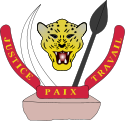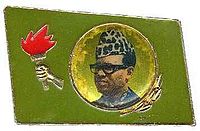- Popular Movement of the Revolution
-
Democratic Republic of the Congo 
This article is part of the series:
Politics and government of
the Democratic Republic of the Congo- Constitution
- President (List)
- Government
- Prime Minister (List)
- Parliament
- Political parties
- Elections
- Constitutional Court
- Court of Cassation
- Subdivisions
- MONUC
- Foreign relations
The Popular Movement of the Revolution (French: Mouvement Populaire de la Revolution or MPR) was a Zairian political party established on May 20, 1967 by then-President Joseph-Désiré Mobutu (later called Mobutu Sese Seko).
Contents
Ideology
Its official ideology, laid down in the Manifesto of N'sele, incorporated "nationalism," "revolution," and "authenticity." Revolution was described as a "truly national revolution, essentially pragmatic," which called for "the repudiation of both capitalism and communism."[1] One of the MPR's slogans was "Neither left nor right," to which would be added "nor even center" in later years.[1]
One-party system
From 1967 until 1990, it was the sole legal party in the country, and membership was compulsory for all citizens (all citizens, from birth, were automatically considered to be members).[2] The 1974 constitution stipulated that in Zaire "there exists a single institution, the MPR, incarnated by its President," that the "President of the MPR is ex officio President of the Republic, and holds the plenitude of power exercise," and that "Mobutism" was constitutional doctrine.[2]
Multi-party period
The single-party system lasted until April 24, 1990, the date of the proclamation of the Third Republic. On that date, Mobutu said that three political parties would be allowed, and he said that these political parties could be two factions of the MPR—moderates and hard-liners—as well as an opposition party, the Union for Democracy and Social Progress (UDPS).[3] Under the new multiparty system, Mobutu said that he would be above political parties, and accordingly he resigned as the head of the MPR on the same date, although he again accepted the post of party leader a year later, on April 21, 1991.[4] After Mobutu's fall in 1997, the party splintered into various factions.
Election results
Presidential Elections
Election date Party candidate Number of votes received Percentage of votes 1970 Joseph-Désiré Mobutu 10,131,669 100% 1977 Mobutu Sese Seko 10,693,804 98.2% 1984 Mobutu Sese Seko 14,885,997 99.1% Parliamentary Elections
Election date Party leader Number of votes received Percentage of votes Number of deputies 1970 Joseph-Désiré Mobutu 9,691,132 99% 240 1975 Mobutu Sese Seko Approved by acclaim[5] 240 1977 Mobutu Sese Seko 10,180,685 100% 252 1982 Mobutu Sese Seko Unknown Unknown 310 1987 Mobutu Sese Seko Unknown Unknown 210 References
- ^ a b Crawford Young and Thomas Turner, The Rise and Decline of the Zairian State, p. 210
- ^ a b Young and Turner, p. 70
- ^ Thomas Turner, "Flying High Above the Toads: Mobutu and Stalemated Democracy", in Political Reform in Francophone Africa (1997), ed. John F. Clark and David E. Gardinier, page 255.
- ^ Zaire: A Country Study POLITICAL REFORM IN THE 1990s - Proclamation of the Third Republic
- ^ Zaire Inter-Parliamentary Union
Categories:- Political parties in the Democratic Republic of the Congo
- Political parties established in 1967
- Political parties disestablished in 1997
- Parties of single-party systems
- Zaire
Wikimedia Foundation. 2010.

